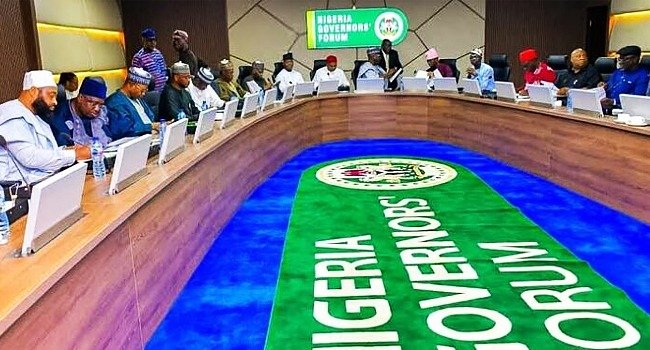The Nigeria Governors’ Forum (NGF), comprising 36 state governors, has declared that the proposed N60,000 minimum wage by the Federal Government is unsustainable. The forum, through a statement by its Acting Director of Media Affairs and Public Relations, Mrs. Halima Ahmed, expressed concerns that such a wage increase would consume the entire monthly allocations of many states, leaving no funds for developmental projects.
Mrs. Ahmed highlighted the need for a fair and sustainable minimum wage, urging members of the tripartite committee to consider the broader economic implications. She emphasized that while the NGF acknowledges the necessity of a new minimum wage and sympathizes with labor unions’ demands for higher wages, the financial realities facing the states must be considered.
“The Nigeria Governors’ Forum (NGF) is in agreement that a new minimum wage is due. The Forum also sympathizes with labor unions in their push for higher wages. However, the Forum urges all parties to consider the fact that the minimum wage negotiations also involve consequential adjustments across all cadres, including pensioners,” Ahmed stated.
The NGF cautioned against hastily signing an agreement without ensuring its sustainability and realism. They stressed that the proposed N60,000 minimum wage would force many states to spend all their Federation Account Allocation Committee (FAAC) funds on salaries, with some states potentially resorting to borrowing to meet these obligations.
“We do not think this will be in the country’s collective interest, including workers,” the statement read. “We appeal that all parties involved, especially the labor unions, consider all the socioeconomic variables and settle for an agreement that is sustainable, durable, and fair to all other segments of society who have a legitimate claim to public resources.”
Organized Labor’s Reaction and Nationwide Strike
The organized labor had previously rejected the N60,000 proposal and initiated a nationwide strike on Monday. The strike was suspended on Tuesday after the Federal Government committed to increasing the minimum wage beyond the N60,000 mark as negotiations resumed.
Following this development, the President of the Trade Union Congress (TUC), Festus Osifo, expressed on Channels Television’s “Politics Today” that labor would not accept any minimal increase to the N60,000 proposal. Osifo emphasized that the government must present a substantial and economically realistic offer in line with current inflationary pressures.
“At the meeting on Friday, they (the tripartite committee) said they would not add anything more to the ₦60,000 but in the meeting of yesterday (Monday), Mr. President was able to commit to doing what is more than ₦60,000,” Osifo stated.
He further stressed that labor is not fixated on their initial proposal of ₦494,000 but insisted that the tripartite committee must demonstrate seriousness and offer a realistic and substantial wage increase.
Ongoing Tripartite Committee Meetings
The tripartite committee responsible for negotiating the new national minimum wage has been in continuous closed-door meetings since the suspension of the industrial action. The current meeting, the fifth since the strike suspension, is being held at the Nicon Luxury Hotel in Abuja.
Key members of the committee in attendance include the Director General of the Nigeria Governors’ Forum, the Minister of Labour and Employment (State) Nkiruka Onyejeocha, Imo State Governor Hope Uzodimma, a representative of the Salaries, Income and Wages Commission, the Minister of Finance Wale Edun, and the Minister of Budget and National Planning Atiku Bagudu.
During Thursday’s session, committee members provided assurances that a new figure may be announced on Friday, reflecting the urgency and importance of reaching a consensus.
As the negotiations continue, all eyes are on the tripartite committee to deliver a wage agreement that balances the demands of the labor unions with the economic realities faced by the state governments. The outcome of these discussions will significantly impact the livelihoods of workers across Nigeria and the financial stability of the states.

